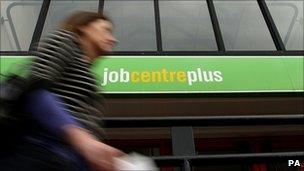UK unemployment falls to 2.47 million
- Published

There are worries that government spending cuts will lead to higher unemployment
The number of people unemployed in the UK fell by 8,000 to 2.47 million in the three months to July, figures show.
This meant the overall UK unemployment rate remained at 7.8%, the Office for National Statistics (ONS) said.
However, the figures also showed the claimant count - those out of work and receiving unemployment benefit - rose by 2,300 in August to 1.47 million.
Many economists fear unemployment will rise later in the year when government cuts begin to kick-in.
There is concern that the UK's labour market will not be strong enough to support the public sector job losses looming under next month's spending review.
The fall in unemployment was below the drop of about 40,000 which analysts had expected.
Addressing the TUC conference in Manchester, Bank of England governor Mervyn King told delegates that "the big picture is that unemployment is higher than before the crisis but lower than many had feared a year ago".
'Destructive'
Employment Minister Chris Grayling said the rising claimant count showed that new jobs were not being filled by people on benefits - and underlined the need for urgent reform of the benefits system.
But shadow work and pensions secretary Yvette Cooper MP said the data showed it was a "foolhardy time" to make big spending cuts, highlighting the rise in benefit claimants as "grim".
"This is even before the major cuts take hold. Clearly the economy is not out of the woods yet," Ms Cooper said.
"Cutting support for jobs and help to get the unemployed back to work right now is reckless and destructive, and will end up costing us all more."
Chris Grayling says the figures "illustrate the challenge we face as a government"
David Kern, chief economist at the British Chambers of Commerce, reiterated his forecast that UK unemployment was likely to peak at about 2.65 million in the first half of 2012.
"While there were some positive developments, particularly a big rise in employment and a fall in inactivity, the number of people working part-time because they could not find a full-time job has increased further," he said.
"There is no room for complacency and the labour market must prepare for the impact on jobs that will result from the government's deficit-cutting measures."
Part-time workers
Within the UK, the jobless rate in Wales fell to 8.4% from 8.3%, in England it dropped to 7.7% from 7.9% and in Northern Ireland it fell to 6.8% from 7.1%.
However, in Scotland, the rate increased to 8.9% from 8.1%.
The number of people employed increased by 286,000 in the three months to July, the ONS said - the biggest quarterly rise since records began in 1971.
However, this was driven by a 166,000 rise in part-time workers, with the ONS saying more students may be taking on part-time jobs alongside their studies.
The ONS figures also showed that average earnings increased by 1.5% in the year to July, compared with a rate of 1.3% the previous month.